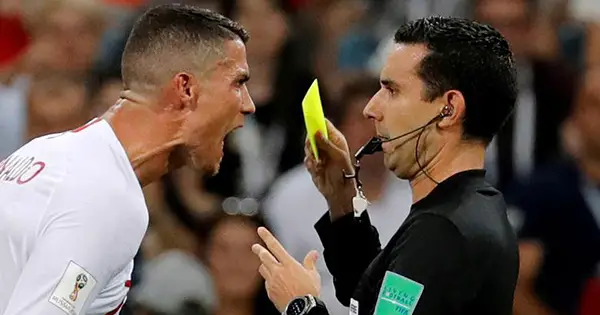Football has the worst set of rules of any major sport. They encourage and even reward cheating and they work against the most important people of all, the fans. There needs to be a massive overhaul because illogical refereeing decisions slow and spoil the game. That’s not the fault of the referees, they’re stuck with a set of crazy regulations.
With some simple changes, we could introduce a lot more footballing danger into matches, making them full of goalscoring chances and so far more exciting.
These are some worst offenders that cheat the fans by reducing playing time.
The referee’s 10-yard walk before giving a free kick
Why do players need to be told what 10 yards looks like? All professionals have been playing the game for at least 10 or 15 years. They’ve had plenty of time to learn to gauge the distance. After all, they can calculate in a split second how hard to kick a ball so it arrives on the feet of team mate 50 yards away.
So why do they need a little white line sprayed on the grass to mark out 10 yards? It’s just an unnecessary ritual that reduces the amount of match time. Instead of watching football, we’re watching a referee strut about milking his moment in the spotlight.
Then the defending side cross the little white line and we have to watch the referee tell them to get back. Minutes are ticking by. The defenders are being allowed to waste time. Fans are sitting in the cold watching a parade of posturing instead of exciting football.
Let’s change the rules so that players defending the free kick have to withdraw 10 yards within 4 seconds of the free kick being awarded, similar to the way a rugby player has to roll out of the way in a ruck.
If a player fails to do so, move the free kick 10 yards closer to the goal. If the defenders transgress again, award a penalty. That should put a stop to the white line pantomime.
It should be that when a free kick is awarded, the attacking team can take it immediately. The team that committed the foul are the offenders so it is only right that they should be put at a disadvantage, and have to scramble to defend while moving 10 yards from the ball.
Imagine the exciting incidents this would give us as the game proceeds at a much more exciting pace than we see now.
Referees should stop explaining the rules to players
Football would be greatly improved and move much faster if referees stopped talking to players, or at least kept the chat to essentials. They should certainly not be explaining the rules and should not be lecturing.
Take a scene that happens in every game. There’s a corner. As it’s about to be taken, defenders and attackers jostle each other. The ref the halts the game while he takes two of the opposing players aside and starts talking to them. This can go for a minute or more with the players answering back.
What are they talking about? Is the ref explaining the rules to them? Is he telling them they can’t push and pull each other?
Surely the least we can expect of professional players is that they know the rules. That being the case, what is the purpose of the conversation?
Fans don’t pay inflated prices to sit in the rain on a freezing day watching a ref explain the rules to offending players. Instead the referee should stick to his job. If someone commits a foul, give it. If not, play on but on no account waste precious playing time by putting yourself centre stage telling players what they should already know.
Zero tolerance of arguing with the referee
One of the most tedious features of a football match is watching players argue with the referee, even surrounding him shouting and swearing. If someone did this in any other work situation they would be sacked. If they did it to someone on the street, they would be arrested so why is tolerated on a football pitch?
It wastes valuable playing time and there’s something deeply unpleasant about it, not just because of the swearing and shouting. It’s more than that. It shows players at their prima donna self-indulgent worst.
Players don’t shout at the referee because they think they’re right. They do it because they know they will get away with it. There’s also the possibility that they will intimidate the referee so he gives them the benefit of the doubt on the next decision. The game should not tolerate this. Again, valuable playing time is lost as the referee tries to calm down a situation in which he’s being bombarded with abuse.
You don’t get it in rugby, where players are much better behaved and respectful. It’s quite amusing to watch a rugby match and see a tiny referee telling off a couple of prop forward giants. They take it like little schoolboys being reprimanded by the head teacher.
You might say such footballers arguing with the ref shows they are passionate but it reality it’s just self-indulgence. They do it because they get away with it. And what about those rugby prop forwards? Anyone fancy telling them they’re not passionate about the game because they don’t shout at the referee. I’ll hold your coat.
Why shirt pulling in football should be an automatic penalty
Shirt pulling may seem minor but apart from injuring someone, it’s the worst offence that can happen on a football pitch. It should be punished by the award of a penalty no matter where it happens on the pitch.
Shirt pulling should be an automatic penalty, and here’s why…
Professional fouls should be a free kick on the edge of the box
For the same reason as shirt pulling. Calling it a professional foul is just a sanitised way of saying deliberate cheating. It involves deliberate obstruction or hand ball. It’s usually done to prevent the opposition benefiting from a breakaway attack.
It could deny a good goalscoring opportunity, even if it happens in the middle of the pitch. The subsequent award of a free kick in the middle of the pitch isn’t adequate recompense.
If you move the free kick to the edge of the box, you provide a punishment that fits the crime and add a lot more excitement to the game. You also create a disincentive to commit professional fouls, which is what we’re trying to achieve with all these proposed rule changes.
Punish players standing over the ball at a free kick
Any time the ref blows for a foul, players from the offending team race to stand over the ball to prevent the free kick being taken quickly and so deny any advantage to the attacking side.
The ref eventually moves the offending player but by then, several seconds have passed. The offending team’s defence is back in place and ready to defend. The attacking team, who may have been bearing down on a ragged defence before the foul, now find themselves facing a re-organised wall of bodies.
This hardly seems fair. Imagine if the rules were changed so that as soon as a foul is committed, players on the offending team must immediately move 10 yards away from where the free kick will be taken. If they’re not out of the way within four seconds, the ball is moved 10 yards nearer to their goal. If they offend again, a penalty is given.
Players would soon get the message that they’re better off moving out of the way. The game would flow much faster and would be far more exciting because there would be more goalscoring opportunities.
In this situation, it’s quite likely that the player who committed the foul might fall to the ground himself in an attempt to get the game stopped and so delay the free kick being taken. This need be no problem. Just play on, as in the next suggested rule change.
Stopping the game when a player is injured
Player safety is of course important but the problem in football is that players abuse that duty of care.
Every game you watch is littered with players collapsing to the floor as soon as their hair is ruffled, rolling around as if they’re in agony before getting back up a few minutes later and running around like nothing has happened.
These injuries are clearly fake. Most football fans have played football for years themselves and they know what injuries feel like. They know the impact they have and how they affect your ability to play on.
If the player is really injured, let the physio come and treat him on the pitch while the game goes on around them. If the player is seriously injured then the medical team can alert the referee and the game can be stopped.
This would help the game flow better and prevent time-wasting gamesmanship. They do it in rugby and it seems to work fine there, so why not in football?
The advantage rule that offers little advantage
It’s quite common to see a referee wave play on when a player is fouled but his team still have possession of the ball. This is good but the advantage period doesn’t last nearly long enough.
The player who’s fouled may cling on to the ball but he may have been knocked out of his stride, slowing him down. Within seconds a defender may get a good tackle in and stop him. The game then continues as if the original foul never happened.
This has to be wrong because the fouled player is not in the position he would have been in had he not been fouled.
The advantage period should last much longer as it does in rugby where a minute or more can pass before the referee declares advantage over.
Change football’s rules to improve the game for fans
All these rule changes will help fit the punishment to the crime. Critics may say it will lead to endless free kicks and penalties but the opposite is true. Once players realise there is a real cost to their professional cheating, they’ll stop doing it.
The most likely outcome is that we’ll have no more penalties or free kicks than now because player won’t commit the offences in the first place because there is too much at stake.
The result will be a much faster free flowing game with more exciting football without the constant interruptions we currently see because of players’ cheating and gamesmanship.
This article was written by one of our more seasoned staff writers who has been watching football for more than 60 years.
Take a look at the alternative view of a fan in his 30s, written by a more sprightly member of the team.
Football fans are being robbed and we shouldn’t stand for it anymore

Lifelong fan of the Premier League, looking on from the outside since 1999 waiting for Forest to return to the top table where they belong. Probably get promoted this season.











